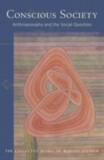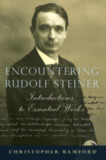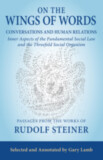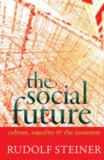The Challenge of the Times
(CW 186)
- Publisher
SteinerBooks - Published
1st February 1979 - ISBN 9780910142830
- Language English
- Pages 224 pp.
- Size 4.25" x 7"
6 lectures, Dornach, November 29 - December 8, 1918 (CW 186)
In these lectures, given just days after the end of World War I, Steiner describes the new developments in mechanics, politics, and economy, as well as new capacities and methods in the West and the East. He reveals their fruitful potentials, but also the dangers of their abuse. He discusses social and antisocial instincts, specters of the Old Testament in the nationalism of the present, and the innate capacities of various nations.
This volume is a translation of Die soziale Grundforderung unserer Zeit (GA 186).
C O N T E N T S:
1. East and West from a Spiritual Point of View
2. The Present from the Viewpoint of the Present
3. The Mechanistic, Eugenic, and Hygienic Aspects of the Future
4. Social and Antisocial Instincts
5. Specters of the Old Testament in the Nationalism of the Present
6. The Innate Capacities of the Nations of the World
Rudolf Steiner
Rudolf Steiner (b. Rudolf Joseph Lorenz Steiner, 1861–1925) was born in the small village of Kraljevec, Austro-Hungarian Empire (now in Croatia), where he grew up. As a young man, he lived in Weimar and Berlin, where he became a well-published scientific, literary, and philosophical scholar, known especially for his work with Goethe’s scientific writings. Steiner termed his spiritual philosophy anthroposophy, meaning “wisdom of the human being.” As an exceptionally developed seer, he based his work on direct knowledge and perception of spiritual dimensions. He initiated a modern, universal “spiritual science” that is accessible to anyone willing to exercise clear and unbiased thinking. From his spiritual investigations, Steiner provided suggestions for the renewal of numerous activities, including education (general and for special needs), agriculture, medicine, economics, architecture, science, philosophy, Christianity, and the arts. There are currently thousands of schools, clinics, farms, and initiatives in other fields that involve practical work based on the principles Steiner developed. His many published works feature his research into the spiritual nature of human beings, the evolution of the world and humanity, and methods for personal development. He wrote some thirty books and delivered more than six thousand lectures throughout much of Europe. In 1924, Steiner founded the General Anthroposophical Society, which today has branches around the world.








